2024届高考英语复习现在进行时表将来课件(26张PPT)
文档属性
| 名称 | 2024届高考英语复习现在进行时表将来课件(26张PPT) | 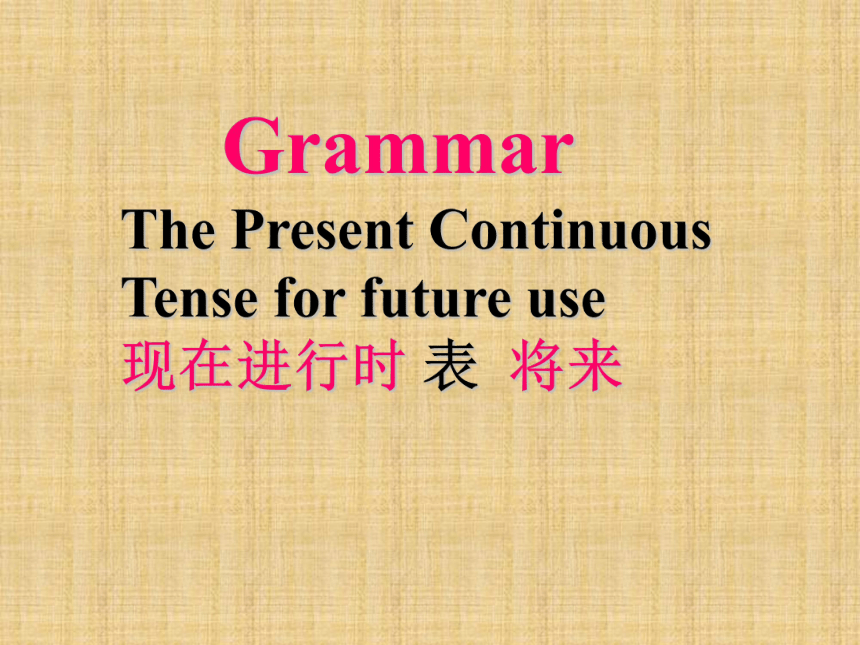 | |
| 格式 | pptx | ||
| 文件大小 | 4.3MB | ||
| 资源类型 | 教案 | ||
| 版本资源 | 通用版 | ||
| 科目 | 英语 | ||
| 更新时间 | 2023-07-23 21:40:21 | ||
图片预览

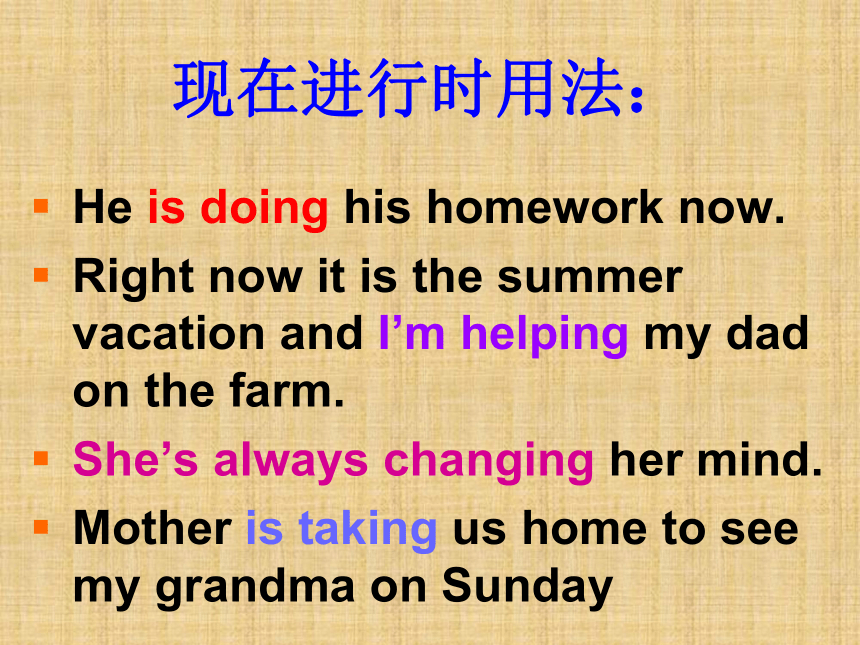

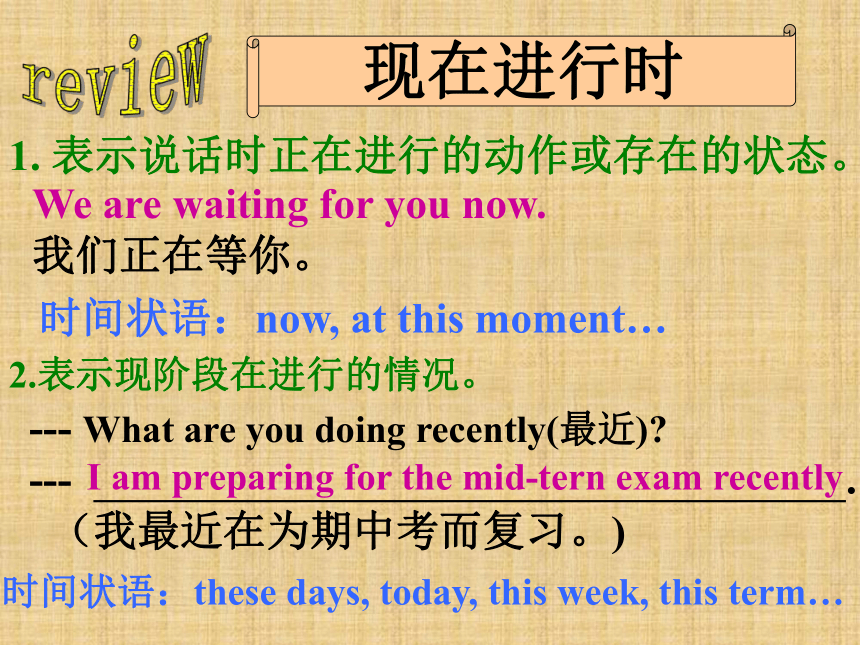

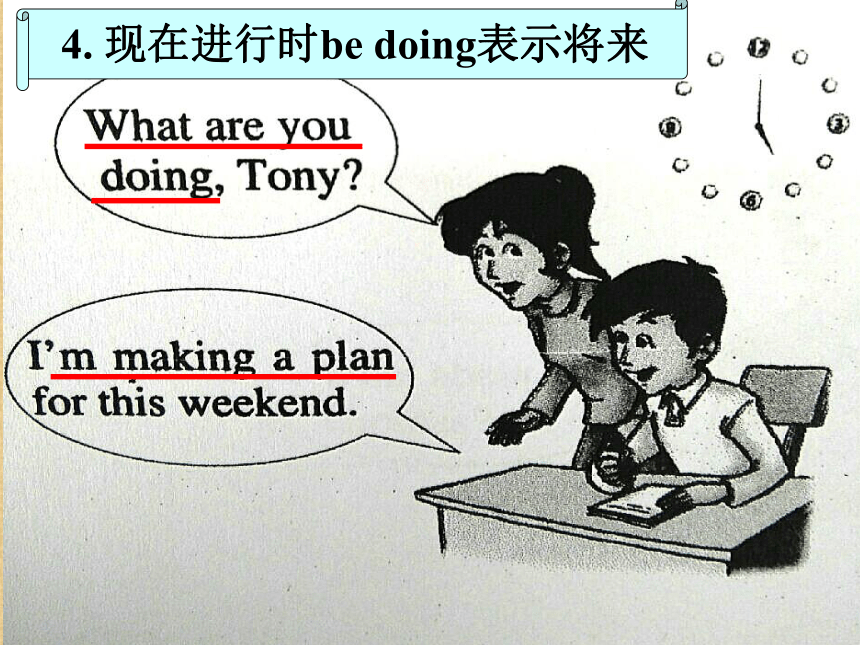
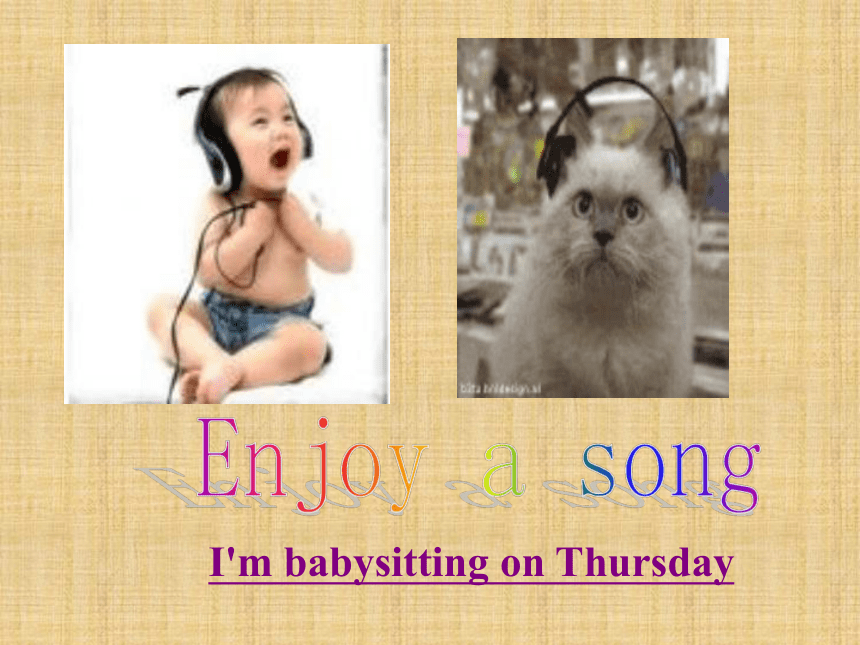
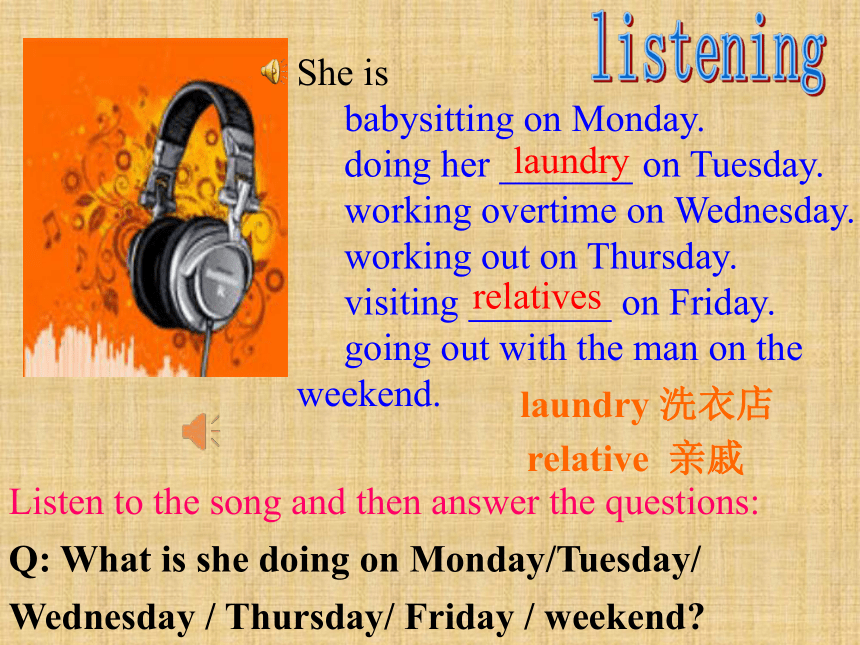
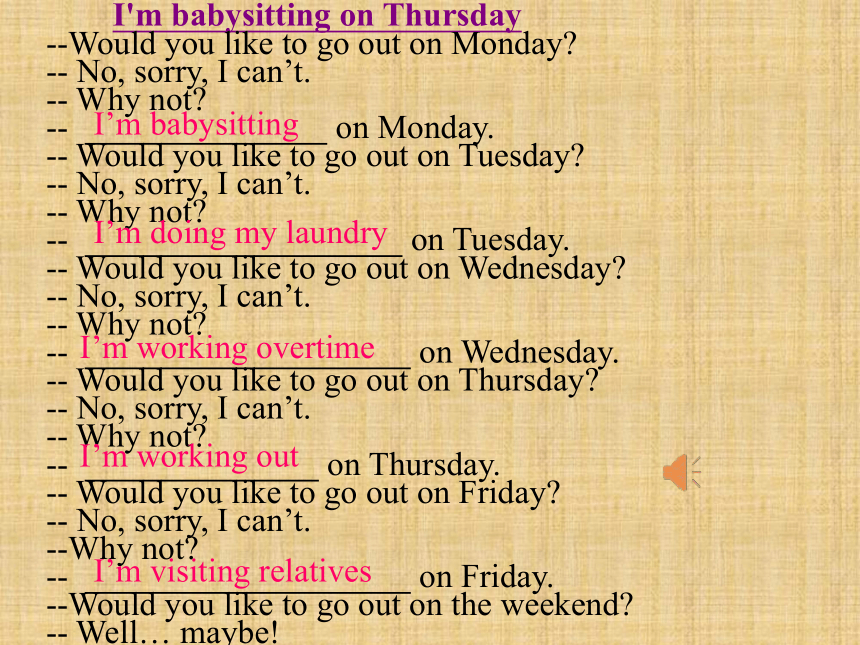
文档简介
(共26张PPT)
Grammar
The Present Continuous Tense for future use
现在进行时 表 将来
现在进行时用法:
He is doing his homework now.
Right now it is the summer vacation and I’m helping my dad on the farm.
She’s always changing her mind.
Mother is taking us home to see my grandma on Sunday
现在进行时
Review
Be (am , is ,are ) + v. ing
I am
He/she/it is
We/you/they are
1. 表示说话时正在进行的动作或存在的状态。
We are waiting for you now.
我们正在等你。
2.表示现阶段在进行的情况。
--- What are you doing recently(最近)
--- .
(我最近在为期中考而复习。)
时间状语:now, at this moment…
时间状语:these days, today, this week, this term…
review
现在进行时
I am preparing for the mid-tern exam recently
3. 表示反复性或习惯性的动作,常与always, continually等连用,表示说话人的赞扬、厌恶、不满和遗憾等感彩。
She is always changing her mind.
她老是改变注意。
She is always thinking about others first.
她总是先想到别人。
4. 现在进行时be doing表示将来
Enjoy a song
I'm babysitting on Thursday
Listen to the song and then answer the questions: Q: What is she doing on Monday/Tuesday/ Wednesday / Thursday/ Friday / weekend
She is
babysitting on Monday.
doing her on Tuesday.
working overtime on Wednesday.
working out on Thursday.
visiting on Friday.
going out with the man on the weekend.
laundry
relatives
listening
relative 亲戚
laundry 洗衣店
I'm babysitting on Thursday
--Would you like to go out on Monday
-- No, sorry, I can’t.
-- Why not
-- on Monday.
-- Would you like to go out on Tuesday
-- No, sorry, I can’t.
-- Why not
-- on Tuesday.
-- Would you like to go out on Wednesday
-- No, sorry, I can’t.
-- Why not
-- on Wednesday.
-- Would you like to go out on Thursday
-- No, sorry, I can’t.
-- Why not
-- on Thursday.
-- Would you like to go out on Friday
-- No, sorry, I can’t.
--Why not
-- on Friday.
--Would you like to go out on the weekend
-- Well… maybe!
I’m babysitting
I’m doing my laundry
I’m working overtime
I’m working out
I’m visiting relatives
Discovering useful structure
I’m babysitting on Monday.
I’m doing my laundry on Tuesday.
I’m working overtime on Wednesday.
I’m working out on Thursday.
I’m visiting relatives on Friday.
现在进行时
表将来
时态
时间
Exploration
Activity 2:
Read the conversation and underline verbs in the present continuous tense. Discuss with a partner when and how these verbs are used.
Amy:
Jeremy:
Hi, Amy! Some friends and I are going to that new water park on Saturday. Do you want to join us
Amy:
Jeremy:
Jeremy:
Hello, Jeremy! What are you doing this weekend
Sure, I’d love to! What time and where
We’re meeting at 10:00a.m. at the bus stop near our school.
How about lunch Are you eating at the water park
Well, I’m bringing my own lunch. I think some of the others
are eating at the park, but the food there is really expensive.
Amy:
英语中还可以用现在进行时(be doing)表示计划安排好要采取的行动或要做的事情。如:
What are you doing for the National Day holiday
Sam is taking advanced literature next term.
We are spending the Spring Festival in Sanya. My parents have booked the air tickets.
注意:在使用现在进行时表示将来的句子中,除非上下文意思清楚,通常都需要时间状语。如:
Are you meeting your coach this weekend
We are having a few guests over tomorrow.
be doing表示将来与be going to do和will do
1. be doing、be going to do都可以表示即将要做的事情。前者更强调事先计划好的安排、确定要做的事情;后者表示说话者的打算和意图,还可以表示根据当前情况作出的预言。如:
比较
A: Hey, your room is really a mess.
B1: I know. I’m cleaning it this afternoon.
(知道啦,我打算今天下午就打扫。)
B2: I know. I’m going to clean it.
(知道啦,我会打扫的。)
2. be doing与will do表示即将发生的事情时,will更强调个人意愿和瞬间的决定。
A: Oh, it’s 8:20. I’m going to be late for my class.
I’m giving my students a very important test this morning.
B: Honey, don’t worry. I’ll drive you to your school right away.
1: When the Present Continuous Tense is used for the future in the main clause, there is often an indication of time.
2: Verbs that are often used in this way are: go, come, leave, get, arrive, meet, see off, take off, return, start, fly, stay (英语中称为位移动词).
3. The action is usually regarded as having been decided upon beforehand.
Presentation
I’m travelling around Europe for two weeks with my aunt and uncle.
We’re renting a car and driving!
My parents are taking me to Hong Kong during the October holiday.
Activity 1:
Read the sentences. What do you think the tense in the sentences expresses
Be doing (the Present Continuous Tense ) is used for future actions, talking about a future plan.
Exploration
Activity 3:
Read the sentences and tick those that express future plans.
1 ______ I’ve just booked my air ticket! I’ll visit my grandparents in
December.
2 ______ Gray might visit China next year, but he’s still not sure.
3 ______ Kate has been invited to a meeting in Iceland. She will apply for a
visa soon.
4 ______ Could you help me with this box, please I’m afraid I’m going to
drop it.
5 ______ A: Hey, are you free for dinner tonight
B: I’m sorry, no. I’ll have dinner with my cousins tonight.
√
√
√
I’m visiting
is applying
I’m having
Summary
现在进行时be doing表示将来
现在进行时可用来表示一个在最近按计划或安排打算要进行的动作;通常带一个表将来的时间状语, 但有明确的上下文时无须指出时间。
能用进行时表将来的动词(并非所有动词):
go, come, leave, start, arrive, give, return, sleep ,stay, play, do, take, get, see off, travel, fly, drive, walk, reach, meet…
come, go, stay, arrive, leave 等趋向动词的现在进行时经常用于表示将来确切的计划。
2) 表示交通方式、行程安排的动词,例如 fly, walk, ride, drive, take (a bus, a taxi)等的现在进行时也经常用于表示将来。
I am leaving China in two hours.
我将会在两个小时后离开中国。
I am flying to Japan tomorrow.
明天我会飞往日本。
另外,表示将来的动作或状态, 还可用以下几种形式:
① will / shall+动词原形: 不以主观意志为转移
的,客观的。
I shall be seventeen years old next month.
② be going to+动词原形:表示即将发生的或最
近打算进行的事。
We are going to have a meeting today.
③ be to+动词原形:表示按计划要发生的事或征
求对方意见,事先安排好的。
Are we to go on with this work
注意
④ be about to+动词原形,表示即将发生的动作,
不与表示将来的时间状语连用。
I was about to go swimming when my guide shouted at me and told me not to do so.
我正要去游泳, 这时向导大声叫我不要去。
(2) 用在状语从句中用一般现在时代替将来时。
If you do that again, I’ll hit you.
⑤一般现在时表示将来时
(1) come, go, leave, move, start, return, arrive,
begin, stay等动词表示的是航班,轮船等时间
表时,用一般现在时表将来。
The plane takes off at 10:10. That is, it’s
leaving in ten minutes.
(3) 用在I bet 和I hope后面, 常用一般现在时
表将来。
I bet you don’t get up before ten
tomorrow.
我敢说你明天不到10点是不会起床的。
Production
Discuss weekend plans with a partner, based on the weather report below.
Saturday Morning Afternoon Evening
20℃ 25℃ 19℃
weather sunny weather: sunny weather:
clear
wind: light wind: light wind: strong
Sunday Morning Afternoon Evening
21℃ 20℃ 17℃
weather cloudy weather: rainy weather:
cloudy
wind: strong wind: light wind: None
A: What are you doing on Saturday morning
B: Well, it’s going to be sunny in the morning and not very windy, so I’m having a picnic with my friends.
...
go hiking
get together
admire amazing city
fly kites
go sailing
play chess
Discuss weekend plans with a partner, based on the weather report below.
A: What are you doing on Saturday evening
B: Well, it's going to blow strong in the evening, so I'm staying at home and watching TV.
Discuss weekend plans with a partner, based on the weather report below.
A: What are you doing on Sunday morning
B: Well, it's going to be cloudy and the wind will be strong. So I'm staying at home and helping my mum with the housework.
A: What are you doing on Sunday evening
B: Well, it's going to be cloudy without any wind. So I'm walking my dog Pingo.
Homework:
1.单元素养检测卷(三)Unit 2
A、B、C、7选5+ Cloze Test;
2、Practise handwriting.
Grammar
The Present Continuous Tense for future use
现在进行时 表 将来
现在进行时用法:
He is doing his homework now.
Right now it is the summer vacation and I’m helping my dad on the farm.
She’s always changing her mind.
Mother is taking us home to see my grandma on Sunday
现在进行时
Review
Be (am , is ,are ) + v. ing
I am
He/she/it is
We/you/they are
1. 表示说话时正在进行的动作或存在的状态。
We are waiting for you now.
我们正在等你。
2.表示现阶段在进行的情况。
--- What are you doing recently(最近)
--- .
(我最近在为期中考而复习。)
时间状语:now, at this moment…
时间状语:these days, today, this week, this term…
review
现在进行时
I am preparing for the mid-tern exam recently
3. 表示反复性或习惯性的动作,常与always, continually等连用,表示说话人的赞扬、厌恶、不满和遗憾等感彩。
She is always changing her mind.
她老是改变注意。
She is always thinking about others first.
她总是先想到别人。
4. 现在进行时be doing表示将来
Enjoy a song
I'm babysitting on Thursday
Listen to the song and then answer the questions: Q: What is she doing on Monday/Tuesday/ Wednesday / Thursday/ Friday / weekend
She is
babysitting on Monday.
doing her on Tuesday.
working overtime on Wednesday.
working out on Thursday.
visiting on Friday.
going out with the man on the weekend.
laundry
relatives
listening
relative 亲戚
laundry 洗衣店
I'm babysitting on Thursday
--Would you like to go out on Monday
-- No, sorry, I can’t.
-- Why not
-- on Monday.
-- Would you like to go out on Tuesday
-- No, sorry, I can’t.
-- Why not
-- on Tuesday.
-- Would you like to go out on Wednesday
-- No, sorry, I can’t.
-- Why not
-- on Wednesday.
-- Would you like to go out on Thursday
-- No, sorry, I can’t.
-- Why not
-- on Thursday.
-- Would you like to go out on Friday
-- No, sorry, I can’t.
--Why not
-- on Friday.
--Would you like to go out on the weekend
-- Well… maybe!
I’m babysitting
I’m doing my laundry
I’m working overtime
I’m working out
I’m visiting relatives
Discovering useful structure
I’m babysitting on Monday.
I’m doing my laundry on Tuesday.
I’m working overtime on Wednesday.
I’m working out on Thursday.
I’m visiting relatives on Friday.
现在进行时
表将来
时态
时间
Exploration
Activity 2:
Read the conversation and underline verbs in the present continuous tense. Discuss with a partner when and how these verbs are used.
Amy:
Jeremy:
Hi, Amy! Some friends and I are going to that new water park on Saturday. Do you want to join us
Amy:
Jeremy:
Jeremy:
Hello, Jeremy! What are you doing this weekend
Sure, I’d love to! What time and where
We’re meeting at 10:00a.m. at the bus stop near our school.
How about lunch Are you eating at the water park
Well, I’m bringing my own lunch. I think some of the others
are eating at the park, but the food there is really expensive.
Amy:
英语中还可以用现在进行时(be doing)表示计划安排好要采取的行动或要做的事情。如:
What are you doing for the National Day holiday
Sam is taking advanced literature next term.
We are spending the Spring Festival in Sanya. My parents have booked the air tickets.
注意:在使用现在进行时表示将来的句子中,除非上下文意思清楚,通常都需要时间状语。如:
Are you meeting your coach this weekend
We are having a few guests over tomorrow.
be doing表示将来与be going to do和will do
1. be doing、be going to do都可以表示即将要做的事情。前者更强调事先计划好的安排、确定要做的事情;后者表示说话者的打算和意图,还可以表示根据当前情况作出的预言。如:
比较
A: Hey, your room is really a mess.
B1: I know. I’m cleaning it this afternoon.
(知道啦,我打算今天下午就打扫。)
B2: I know. I’m going to clean it.
(知道啦,我会打扫的。)
2. be doing与will do表示即将发生的事情时,will更强调个人意愿和瞬间的决定。
A: Oh, it’s 8:20. I’m going to be late for my class.
I’m giving my students a very important test this morning.
B: Honey, don’t worry. I’ll drive you to your school right away.
1: When the Present Continuous Tense is used for the future in the main clause, there is often an indication of time.
2: Verbs that are often used in this way are: go, come, leave, get, arrive, meet, see off, take off, return, start, fly, stay (英语中称为位移动词).
3. The action is usually regarded as having been decided upon beforehand.
Presentation
I’m travelling around Europe for two weeks with my aunt and uncle.
We’re renting a car and driving!
My parents are taking me to Hong Kong during the October holiday.
Activity 1:
Read the sentences. What do you think the tense in the sentences expresses
Be doing (the Present Continuous Tense ) is used for future actions, talking about a future plan.
Exploration
Activity 3:
Read the sentences and tick those that express future plans.
1 ______ I’ve just booked my air ticket! I’ll visit my grandparents in
December.
2 ______ Gray might visit China next year, but he’s still not sure.
3 ______ Kate has been invited to a meeting in Iceland. She will apply for a
visa soon.
4 ______ Could you help me with this box, please I’m afraid I’m going to
drop it.
5 ______ A: Hey, are you free for dinner tonight
B: I’m sorry, no. I’ll have dinner with my cousins tonight.
√
√
√
I’m visiting
is applying
I’m having
Summary
现在进行时be doing表示将来
现在进行时可用来表示一个在最近按计划或安排打算要进行的动作;通常带一个表将来的时间状语, 但有明确的上下文时无须指出时间。
能用进行时表将来的动词(并非所有动词):
go, come, leave, start, arrive, give, return, sleep ,stay, play, do, take, get, see off, travel, fly, drive, walk, reach, meet…
come, go, stay, arrive, leave 等趋向动词的现在进行时经常用于表示将来确切的计划。
2) 表示交通方式、行程安排的动词,例如 fly, walk, ride, drive, take (a bus, a taxi)等的现在进行时也经常用于表示将来。
I am leaving China in two hours.
我将会在两个小时后离开中国。
I am flying to Japan tomorrow.
明天我会飞往日本。
另外,表示将来的动作或状态, 还可用以下几种形式:
① will / shall+动词原形: 不以主观意志为转移
的,客观的。
I shall be seventeen years old next month.
② be going to+动词原形:表示即将发生的或最
近打算进行的事。
We are going to have a meeting today.
③ be to+动词原形:表示按计划要发生的事或征
求对方意见,事先安排好的。
Are we to go on with this work
注意
④ be about to+动词原形,表示即将发生的动作,
不与表示将来的时间状语连用。
I was about to go swimming when my guide shouted at me and told me not to do so.
我正要去游泳, 这时向导大声叫我不要去。
(2) 用在状语从句中用一般现在时代替将来时。
If you do that again, I’ll hit you.
⑤一般现在时表示将来时
(1) come, go, leave, move, start, return, arrive,
begin, stay等动词表示的是航班,轮船等时间
表时,用一般现在时表将来。
The plane takes off at 10:10. That is, it’s
leaving in ten minutes.
(3) 用在I bet 和I hope后面, 常用一般现在时
表将来。
I bet you don’t get up before ten
tomorrow.
我敢说你明天不到10点是不会起床的。
Production
Discuss weekend plans with a partner, based on the weather report below.
Saturday Morning Afternoon Evening
20℃ 25℃ 19℃
weather sunny weather: sunny weather:
clear
wind: light wind: light wind: strong
Sunday Morning Afternoon Evening
21℃ 20℃ 17℃
weather cloudy weather: rainy weather:
cloudy
wind: strong wind: light wind: None
A: What are you doing on Saturday morning
B: Well, it’s going to be sunny in the morning and not very windy, so I’m having a picnic with my friends.
...
go hiking
get together
admire amazing city
fly kites
go sailing
play chess
Discuss weekend plans with a partner, based on the weather report below.
A: What are you doing on Saturday evening
B: Well, it's going to blow strong in the evening, so I'm staying at home and watching TV.
Discuss weekend plans with a partner, based on the weather report below.
A: What are you doing on Sunday morning
B: Well, it's going to be cloudy and the wind will be strong. So I'm staying at home and helping my mum with the housework.
A: What are you doing on Sunday evening
B: Well, it's going to be cloudy without any wind. So I'm walking my dog Pingo.
Homework:
1.单元素养检测卷(三)Unit 2
A、B、C、7选5+ Cloze Test;
2、Practise handwriting.
